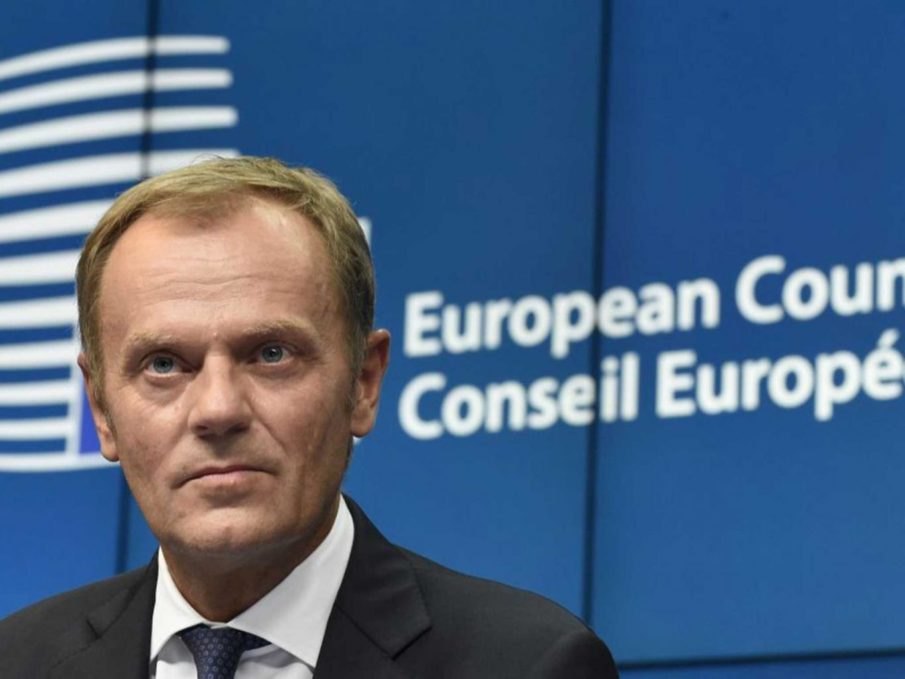Donald Tusk, the president of the European Union, released a letter to 27 EU leaders earlier this week indicating that the United States under President Trump is as much a threat to the future of Europe as Russia or China.
Donald Trump put EU leaders on their heels along the campaign trail when he pointed out how very few NATO member states actually fulfill their financial obligation to the alliance, and suggested that if they were unwilling to live up to their end of the bargain, the United States may not honor another portion of the NATO agreement stipulating that every nation come to the defense of an attacked member.
Leaders throughout Europe, suddenly faced with the possibility of having to defend their own borders with military forces that have atrophied due to neglect since NATO began relying heavily on the combined military might of the United States and other larger member nations, promptly set to work establishing a European defense fund—a move that could be seen as precursor to establishing a joint European army, which would effectively be NATO without American or British support.
EU President Donald Tusk’s letter laid out what he sees as the potential external risks the EU faces in the coming years. Among them: Russian aggression, Chinese assertiveness, radical Islam, and the United States of America.
“The challenges currently facing the European Union are more dangerous than ever before in the time since the signature of the Treaty of Rome,” Tusk’s letter said.
“The first threat, an external one, is related to the new geopolitical situation in the world and around Europe,” he continued. “An increasingly…let us call it assertive China, especially on the seas; Russia’s aggressive policy towards Ukraine and its neighbors; wars, terror, and anarchy in the Middle East and in Africa, with radical Islam playing a major role; as well as worrying declarations by the new American administration all make our future highly unpredictable.”
He went on to claim that Trump’s administration has already “put into question the last 70 years of American foreign policy.”
President Trump has drawn the ire of many in the United States and globally for a rash of executive orders he’s signed since taking office. Most controversial among them was a new policy regulating the process in which refugees and other immigrants enter the United States, enacting a temporary ban on anyone entering the country from seven specific states the federal government has deemed to have ties to radical Islam.
Tusk went on to call for the European Union to further dissolve the ideological borders between the nations that comprise the continent, calling on member states to strive for a more integrated EU.
“The disintegration of the European Union will not lead to the restoration of some mythical, full sovereignty of its member states, but to their real and factual dependence on the great superpowers: the United States, Russia, and China,” Tusk wrote. “Only together can we be fully independent. We must therefore take assertive and spectacular steps that would change the collective emotions and revive the aspiration to raise European integration to the next level.”
It has been reported that European diplomats met in Brussels on Monday to discuss potential responses to elements of Trump’s plans they believe will place them at odds with the new president, but many members were cautious of alienating the United States—a key ally in a potential struggle with Russia and the most dominant military force on the planet.
Already have an account? Sign In
Two ways to continue to read this article.
Subscribe
$1.99
every 4 weeks
- Unlimited access to all articles
- Support independent journalism
- Ad-free reading experience
Subscribe Now
Recurring Monthly. Cancel Anytime.
Tusk ended his letter by calling for unity, not just within the EU, but with America—despite repeatedly associating Europe’s most powerful ally with Europe’s biggest boogey-man, Russia, and listing the American president alongside radical Islam as a threat to the stability of the continent. He concluded his letter with, “We should remind our American friends of their own motto: United we stand, divided we fall.”
Perhaps we should remind our European friends of the tens of thousands of U.S. troops currently stationed or deployed in defense of their continent, or of the U.S. naval presence ensuring trade routes between continents remain secure and free from piracy. After all, Mr. Tusk, we’ve been standing united for some time.
Featured image courtesy of AFP










COMMENTS